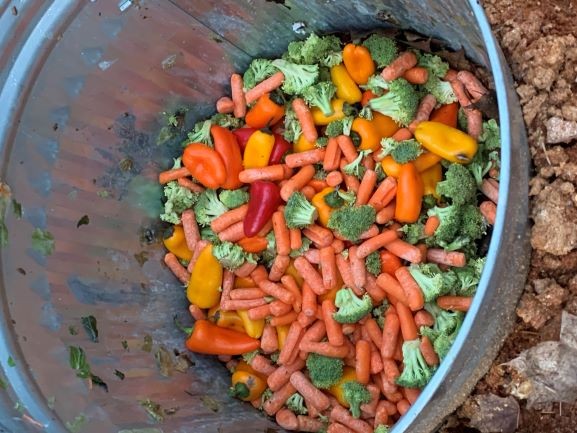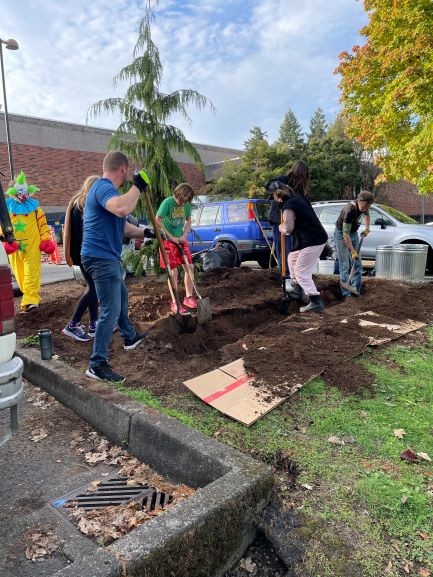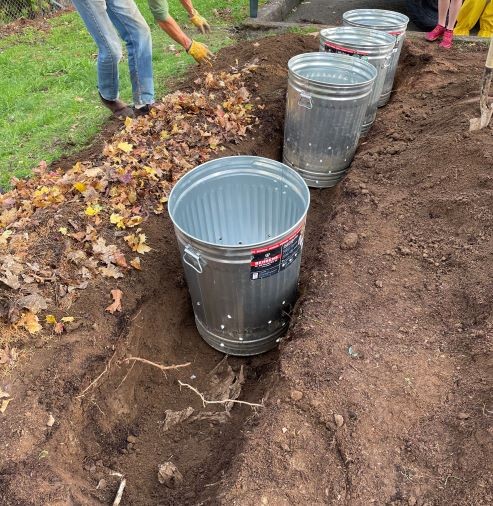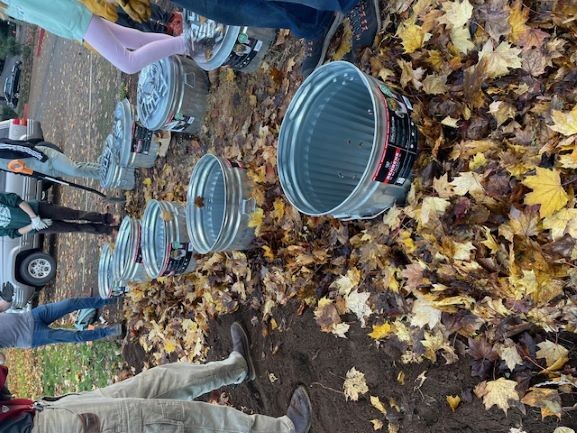Clark County Green News
Discovery Middle School takes on exciting new food waste diversion project
A groundbreaking initiative took place at Vancouver's Discovery Middle School this last November. Clark County Green Schools partnered with science teacher, Ron Hall, and his students for a pilot project to install a first-of-its-kind food waste digester on school grounds! The digester allows the school to easily and conveniently compost all food waste from their kitchen. Diverting this material from the landfill will help protect our environment, combat climate change and provide valuable nutrients to feed back to the school's community garden.
To start the pilot project, Ron worked closely with Green Schools and the cafeteria staff to set up a system to collect food waste and assist students in transporting the material to the digester daily. The digester system was installed by drilling ½ inch holes into the bottom and sides (¾ of the way up from the bottom) of ten, 32-gallon galvanized metal trash cans. The cans were then placed into two dug trenches in the ground, deep enough for all the holes to be covered. Students helped backfill and mound up the material around the cans to create a habitat for decomposers to break down the food waste. The material included leaves, spent mushroom substrate from a local mushroom grower and yard and garden waste.Food waste from the cafeteria is dumped into the metal cans and covered with a thin layer of dry carbon-rich material (leaves, shredded paper, paper towels) to help balance the system and prevent odor and flies. The filled cans are then capped with a layer of cardboard to decompose mostly under anaerobic (no oxygen) conditions. During this pilot project, different kinds of beneficial fungus (molds) were observed breaking down the material. This is a build-it-and-the-decomposers-will-come process, meaning worms and other decomposers don't have to be present when the project begins.
In the first two months of operation, five cans were filled. With the 10-month school year, that would equate to filling 25 cans worth of kitchen food waste material. The 10 can digester system is currently on schedule to process 3,750 pounds of food waste from Discovery Middle School's central kitchen, which also prepares meals for three additional elementary schools. The first harvest of digested material is projected to take place in February, allowing time for the food waste to digest and break down.
How to launch a similar project at your school:
Step 1: Start a Green Team! Tap into the desire to build more sustainable systems to help the earth.
Step 2: Meet with your kitchen staff to learn about daily food waste in your school.Step 3: Work with Green Schools to set up a food waste collection bin and to install a food waste digester system.
Step 4: Move and dump food scraps into the digester system daily.
Step 5: After the filled cans have digested the food waste (approximately two months), pull the cans out of the ground and dump contents for final soil curing.
Step 6: Replace empty can into its hole and begin again!
The food waste digester system is a two-step process requiring gardens or a trench system to allow for the digested food waste to cure in the soil. An added benefit is the organic material can be used in your school garden or school grounds, eliminating the need for chemical fertilizer.
If you are interested in providing on-site science and outdoor learning opportunities by setting up a food waste digester system, please contact Green Schools and let us know!
When you subscribe to the blog, we will send you an e-mail when there are new updates on the site so you wouldn't miss them.







